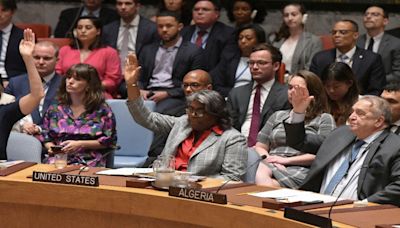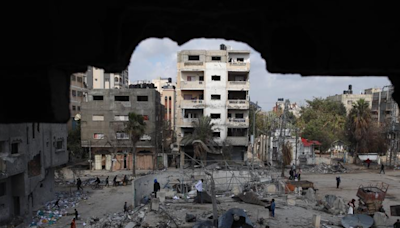搜尋結果
The Israeli–Palestinian conflict is an ongoing military and political conflict about land and self-determination within the territory of the former Mandatory Palestine. [18] [19] [20] Key aspects of the conflict include the Israeli occupation of the West Bank and Gaza Strip, the status of Jerusalem, Israeli settlements, borders, security ...
The Six-Day War (Hebrew: מ ל ח מ ת ש ש ת ה י מ ים, Milḥemet Šešet HaYamim; Arabic: النكسة, an-Naksah, lit. ' The Setback ' or حرب 1967, Ḥarb 1967, 'War of 1967') or June War, also known as the 1967 Arab–Israeli War or Third Arab–Israeli War, was fought between Israel and a coalition of Arab states (primarily Egypt, Syria, and Jordan) from 5 to 10 June 1967.
What links here Related changes Upload file Special pages Permanent link Page information Cite this page Get shortened URL Download QR code The region today: Israel, the West Bank, the Gaza Strip and the Golan Heights The history of the Israeli–Palestinian conflict traces back to the late 19th century when Zionists sought to establish a homeland for the Jewish people in Ottoman-controlled ...
The fifth war of the Gaza–Israel conflict since 2008, it is part of the broader Israeli–Palestinian conflict, and the most significant military engagement in the region since the Yom Kippur War 50 years earlier. [98] The war began when Hamas-led militant groups launched a surprise attack on Israel on 7 October.
- History
- Prominent Indictees
- Definition
- Legality of Civilian Casualties
- See Also
- Further Reading
- External Links
Early examples
In 1474, the first trial for a war crime was that of Peter von Hagenbach, realised by an ad hoc tribunal of the Holy Roman Empire, for his command responsibility for the actions of his soldiers, because "he, as a knight, was deemed to have a duty to prevent" criminal behaviour by a military force. Despite having argued that he had obeyed superior orders, von Hagenbach was convicted, condemned to death, and beheaded.
Hague Conventions
The Hague Conventions were international treaties negotiated at the First and Second Peace Conferences at The Hague, Netherlands, in 1899 and 1907, respectively, and were, along with the Geneva Conventions, among the first formal statements of the laws of war and war crimes in the nascent body of secular international law.
Lieber Code
The Lieber Code was written early in the American Civil War and President Abraham Lincoln issued as General Order 100 on April 24, 1863, just months after the military executions at Mankato, Minnesota. General Order 100, Instructions for the Government of the Armies of the United States in the Field (Lieber Code) was written by Franz Lieber, a German lawyer, political philosopher, and veteran of the Napoleonic Wars. Lincoln made the Code military law for all wartime conduct of the Union Army....
Heads of state and government
To date, the present and former heads of state and heads of governmentthat have been charged with war crimes include: 1. Russian President Vladimir Putin, for his contribution in the illegal abduction of children from Ukraine and deportation into Russia during the Russian invasion of Ukraine. 2. German Großadmiral and President Karl Dönitz and Japanese Prime Ministers and Generals Hideki Tōjō and Kuniaki Koisoin the aftermath of World War II. 3. Former Serbian President Slobodan Miloševićwas...
Other
1. Yoshijirō Umezu, general of the Imperial Japanese Army 2. Iwane Matsui, general of the Imperial Japanese Army who was known for his involvement in the Nanjing Massacre 3. Seishirō Itagaki, War minister of the Empire of Japan 4. Hermann Göring, Commander in Chief of the Luftwaffe. 5. Ernst Kaltenbrunner and Adolf Eichmann, high-ranking members of the SS. 6. Wilhelm Keitel, Generalfeldmarschall, head of the Oberkommando der Wehrmacht. 7. Erich Raeder, Großadmiral, Commander in Chief of the K...
War crimes are serious violations of the rules of customary and treaty law concerning international humanitarian law, criminal offenses for which there is individual responsibility. Colloquial definitions of war crime include violations of established protections of the laws of war, but also include failures to adhere to norms of procedure and rule...
Under the law of armed conflict (LOAC), the death of non-combatants is not necessarily a violation; there are many things to take into account. Civilians cannot be made the object of an attack, but the death/injury of civilians while conducting an attack on a military objective are governed under principles such as of proportionality and military n...
Cryer, Robert (2007). An introduction to international criminal law and procedure. Cambridge University Press. ISBN 978-0-521-87609-4.Dinstein, Yôrām (2004). The conduct of hostilities under the law of international armed conflict. Cambridge University Press. ISBN 978-0-521-54227-2. Retrieved November 14, 2010.Hagopian, Patrick (2013). American Immunity: War Crimes and the Limits of International Law.Amherst, MA: University of Massachusetts Press.Horvitz, Leslie Alan; Catherwood, Christopher (2011). Encyclopedia of War Crimes & Genocide (Hardcover). Vol. 2 (Revised ed.). New York: Facts on File. ISBN 978-0-8160-8083-0. ISBN 0-8160-8083-6Australian Bunker And Military Museum - abmm.org Archived March 30, 2022, at the Wayback MachineThis is a list of wars and other major military engagements involving Israel.Since its declaration of independence in May 1948, the State of Israel has fought various wars with its neighbouring Arab states, two major Palestinian Arab uprisings known as the First Intifada and the Second Intifada (see Israeli–Palestinian conflict), and a broad series of other armed engagements rooted in the ...
ISBN. 978-1-60846-097-7. Gaza in Crisis: Reflections on Israel's War against the Palestinians is a 2010 collection of interviews and essays from Noam Chomsky and Ilan Pappé that examine Israel's Operation Cast Lead and attempts to place it into the context of Israeli–Palestinian conflict. The book was edited by Frank Barat, who had conducted ...



